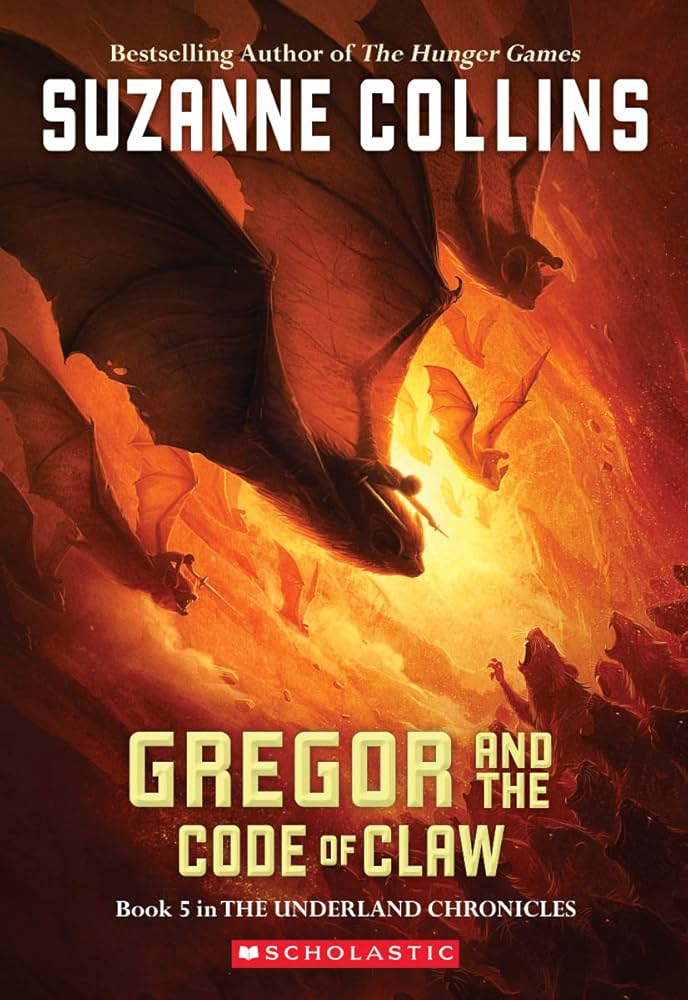
Gregor and the Code of Claw
Chapter 19
by Suzanne, Collins,In Chapter 19, Lizzie and the code team make a breakthrough in deciphering the rats’ communication. Lizzie deduces that the code relies on a fixed set of letters—G, O, R, and E—while the rest follow a simple shift cipher. The team tests the system successfully, translating a message about diggers arriving near Regalia. Their success sparks a jubilant celebration among the group, with characters like Reflex, Daedalus, and Heronian expressing their joy in unique ways. Ripred, however, insists on secrecy, warning the team not to reveal their breakthrough to outsiders, as it could compromise their advantage.
Despite the victory, underlying tensions remain. Luxa and Gregor exchange a knowing glance, hinting at the unresolved prophecy of Gregor’s death. Gregor masks his worries to preserve the moment, praising Lizzie and the team for their collective effort. Hazard, eager to share the news with the nibblers, is swiftly shut down by Ripred, who emphasizes the need for discretion. The team shifts focus to decoding fresh messages, uncovering strategic details about alliances and enemy movements, though much of the information is outdated.
Gregor, exhausted and injured, struggles to stay awake but eventually succumbs to sleep. Upon waking, he finds the others resting and quietly tends to his hunger and pain. His thoughts drift to his family—his mother’s care at the Fount, his father’s potential recklessness, and the overwhelming conditions in Regalia’s hospital. Despite his discomfort, Gregor returns to decoding, sifting through old messages until he stumbles upon a heartbreaking revelation about Twitchtip, the outcast rat who once saved him.
The chapter ends on a somber note as Gregor deciphers a message about Twitchtip’s fate, flooding him with memories of their bond. The discovery contrasts sharply with the earlier triumph, underscoring the personal costs of war. Gregor’s emotional turmoil lingers as he grapples with the past and the uncertain future, leaving readers with a poignant reminder of the stakes at hand.
FAQs
1. How did Lizzie and the code team decipher the rats’ messages in this chapter?
Answer:
The team discovered the Code of Claw used a combination of fixed letters and a simple cipher. Lizzie realized the letters G, O, R, and E remained unchanged (likely derived from “Gregor” or “Gore”). The other letters followed a single-shift cipher (e.g., A→B, B→C), skipping E since it was fixed. This breakthrough allowed them to decrypt messages like “Diggers arrive at camp near Regalia.” The solution emerged through collaborative problem-solving, with contributions from Hazard (anagram idea), Heronian, and Min (simplicity principle).2. What does the decryption scene reveal about the dynamics of the code team?
Answer:
The celebration after cracking the code highlights the team’s camaraderie and diverse personalities. Ripred’s joy (tossing Lizzie, spinning) contrasts with his usual gruffness, while Reflex’s silk “streamers” and Daedalus’s wing-flinging show playful creativity. Even Min’s “creaky dance” reflects unity. The moment also underscores Lizzie’s growth—she credits the team, emphasizing collaboration over individual achievement. However, Ripred’s swift return to seriousness (“swear to secrecy”) reminds readers of the war’s stakes, balancing triumph with tension.3. Analyze how Gregor’s internal conflict manifests in this chapter.
Answer:
Gregor struggles to reconcile his personal dread (prophesied death) with the group’s optimism. He reassures Hazard (“Everything’s going to be fine”) despite Luxa’s worried glance, masking his fears to preserve morale. His physical pain and hunger mirror emotional exhaustion, yet he pushes himself to work. The discovery of Twitchtip’s fate resurfaces guilt and loyalty to outcasts, contrasting with the war’s dehumanizing scale. His thoughts about family (dad’s potential recklessness, mom’s care) further reveal his burden as both warrior and protector.4. Why is secrecy about the broken code crucial, and how might this decision impact later events?
Answer:
Ripred insists on secrecy to maintain their tactical advantage—if the rats learn their code is cracked, they’ll change it, cutting off vital intelligence. This mirrors real-world espionage logic. However, withholding news from allies (like the nibblers) risks eroding trust, as Gregor notes. The tension between morale and security could escalate, especially if characters like Hazard disobey. Additionally, Solovet’s involvement hints at potential militarization of the information, raising ethical questions about how Regalia will use this power.5. How does Twitchtip’s message serve as a narrative turning point for Gregor?
Answer:
Twitchtip’s fate forces Gregor to confront the war’s personal costs. Her message—interrupted but implying torture—reconnects him to their bond, challenging the dehumanization of rats. This echoes earlier themes of empathy (e.g., saving her in the whirlpool). The cliffhanger ending (“But she hadn’t died…”) suggests unresolved trauma, potentially motivating Gregor to act against the Bane or question prophecies. It also contrasts with the code-breaking victory, reminding readers that war’s brutality overshadows even intellectual triumphs.
Quotes
1. “A letter can be itself!”
This triumphant exclamation by Lizzie and Ripred captures the breakthrough moment when the code team realizes letters can remain unchanged in the cipher. It represents the key insight that allows them to crack the rats’ communication system, changing the course of their intelligence efforts.
2. “But when she looked at Gregor, he could tell she was thinking of the rest of the prophecy. Of his death.”
Amidst the celebration, this moment reveals Luxa’s unspoken concern about Gregor’s fate. It underscores the tension between their current victory and the looming prophecy, showing how personal stakes persist even in moments of collective success.
3. “No one outside of this room must know we have broken the code. I will personally inform Solovet. The rest of you must swear to secrecy.”
Ripred’s serious command highlights the strategic importance of keeping their code-breaking success confidential. This moment shifts the tone from celebration to operational security, showing the ongoing need for caution despite their achievement.
4. “Twitchtip. Memories of the rat swam before his eyes… And then they were friends, despite the rat/human thing.”
Gregor’s emotional recollection of Twitchtip reveals the depth of his cross-species relationships and the personal cost of war. This passage humanizes the conflict by focusing on individual connections that transcend traditional animosities.
